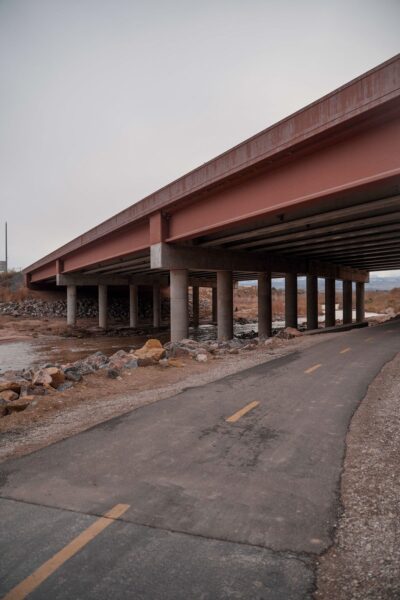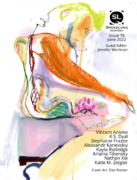The little slough called Paradise Cut used to carry the weight of the San Joaquin River, a tumbling surge of dark water whose purpose was to irrigate the almond trees that dot the landscape. Now, it is quiet below a bridge that I must drive over to visit my mother.
There used to be a sign. If my mind wanders and I come to the happy families launching pumpkins from catapults or navigating the maize maze, I know I’ve gone too far.
I visit the underbelly of that bridge and calculate equations that never add up. The slough is dry in the summer, the cattails brown and stiff. But there have been times when it has been almost lovely. There’s a simple grace to it in winter. I once saw an egret that didn’t stir when I approached it, which I took as a sign.
If I visit early in the morning, there are fewer cars on the road. I can hear the soundtrack that I hope he heard. A rustling among the weeds. A far-off tractor’s growl. Maybe his window was down and he thought, “I can rest there.”
My mother and I didn’t find him. When we came near, we were stopped by my father’s friend who put his hand on my shoulder and said, “Go home, honey.” And, like obedient children, we did. I don’t remember what we said. I held her hand. And we waited, until the lights of the police car came across the window and the officer told us. My mother collapsed and I, strangely upright, was handed a Ziploc bag with a comb, a crisp white handkerchief, and a wedding ring, stained with blood.
I’ve tried to map the before, covering pages with possible trajectories, tributaries. His employees say he just stood up and walked out, his trademark saddle oxfords squeaking on the cement floor. “I didn’t see a gun,” one of his employees said, his eyes like a reprimanded child.
I found the empty beige leather rifle case flung behind his office door. His father’s gun, a dark message of inheritance. A half-empty box of rifle cartridges tucked behind his meticulous filing system; file folders marked in his boxy handwriting. Outstanding Orders. Rim Specs. I’ve written these titles down, marking their place in the strange map I’m creating.
My father’s heart was not damaged by the gunshot aimed at it. The coroner reported that his intended target stopped beating without any contact with the bullet. This detail haunts me. My father’s heart remained intact, but I can’t say the same for my own.
My father is an absence. A gap. I’d like to feel him in the sky. Or in a song. I wait for signs. When the clock turns 11:09, I think it is my father saying hello because I grew up in a house whose number was 1109. Sometimes, I’ll wait for the numbers to click into place, their turning an opening of sorts. I wish I could say that I dream about him and find a closeness in the subconscious. But the only dream I’ve had about him in all this time is one in which he wanders through my backyard with a hole in his heart, through which I can see the stars. My father is a collection of objects. Artifacts that began with a Ziploc, handed to me with the reverence of a sacred relic. He is the smell of grease on a wheel and the thick layer of dust on his office desk.
Paradise Cut. A nod to Milton’s Paradise Lost ? “…in the lowest deep a lower deep still threatening to devour me opens wide.” Paradise Cut is not deep. Its shallow nature belies what happened there. But it is a lower deep that I feel as a sinking, every time I drive over it, east and west, to see my mother. It is there in the maps I craft, the compass skewed. He is there under the bridge. It is unmarked to everyone but me.
________________________
MLA. Milton, John, 1608-1674. Paradise Lost. London; New York :Penguin Books, 2000.
Hart, John. “Paradise Cut -.” Bay Nature, 1 Apr. 2010, https://baynature.org/article/paradise-cut/.



 The SmokeLong Grand Micro Contest (The Mikey) is now an annual competition celebrating and compensating the best micro fiction and nonfiction online.
The SmokeLong Grand Micro Contest (The Mikey) is now an annual competition celebrating and compensating the best micro fiction and nonfiction online.